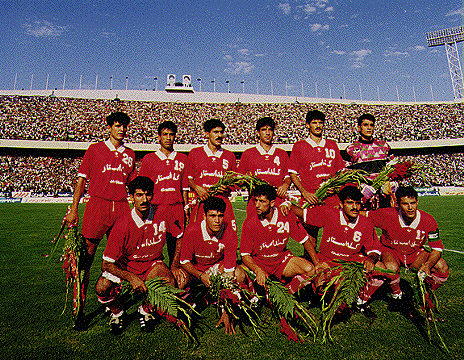

Standing from right: Nima Nakisa, Ali Daie, Behrouz Rahbari Fard, Mohammad Ali Peyrovani, Mahmoud Shafeie, Qassem Ataie. Sitting from right: Farshad Piyous, Behzad Dadashzadeh, Davoud Mahboub, Shahram Baratpouri, Hassan Shirmohammadi.
Photo: Ali Rahbar, Tamashagaran

There was little resemblance to the great football star I remembered from old posters and football games on TV. His sunken cheeks were rough with an uneven beard -- an unfortunate distraction from his neat moustache. And his bald "spot" was anything but.
Hamid Derakhshan had come to the offices of Tamashagaran, a football magazine for an interview. He had just accepted a coaching position at Iran's most popular football club, Persepolis -- the club he had played as a halfback for many years.
With a coarse, shrill voice, Derakhshan answered questions from the reporters about the team's recent poor showing, which was all very interesting to the others in the room.
My mind had escaped to the glory days of Iranian football, when winning the Asian championship was almost a forgone conclusion and sights were firmly set on becoming a serious World Cup contender.
If there was ever an Iranian "Dream Team," it had to be the one that made it to the World Cup in 1978 and played a few respectable games before being knocked out by the majors.
But since the revolution, the Iranian national team has won the Asian crown only once and failed to qualify again for the World Cup.
Persepolis has fared better. There haven't been many years when it hasn't won the league title with relative ease. But since Ali Parvin was sacked from his head coaching position at Persepolis three years ago, the team has not performed as well.
Its standing in the league had slipped to third, with Bahman and Pass holding first and second. Derakhshan explained that Persepolis had lost its best players and had not been coached properly.
Nine players and members of the coaching staff had been disqualified by the football authorities for various reasons. He did not say what those reasons were, assuming everyone in the room already knew. The disqualified players included the league's top goal scorers, Farshad Piyous and Ali Daie.
Derakhshan also had some criticism for Jurgen Geder, a third-rate former German professional football player who was offering his services to Iranian teams real cheap. Geder became the head coach of Persepolis for a few months early last year. He had chosen Derakhshan to be his assistant but soon lost him.
"I stepped aside after a couple of months because I didn't learn anything new from him," Derakhshan said. "I have not come here to beat on any one, but Mr. Geder's knowledge of the game is far from good."
Now Derakhshan was back as an assistant coach, this time under a new head coach, Stanko Poklepovic, a Croatian who was probably more than happy with getting half of his predecessor's salary. Poklepovic had head coached the Iranian national team for a few months in 1994 but was dismissed after the team's miserable showing at the Hiroshima Asian Games.
The club, being the league's richest, could afford foreign coaches. And it pays its players -- 10 of whom are members of the national teams (Adult and youth) -- between 800,000 to nine million tomans a year. The money comes from Persepolis' phenomenal following. Its loyal fans -- with their red headbands and flags -- easily outnumber and outshout any other.
This is not music to the ears of religious conservatives, who see football as having a corrupting influence on society's youth, who make up more than 50 percent of the population. What bothers them in particular is that the most popular team has a name like Persepolis.
After the revolution, the country's two top clubs, Persepolis and Taj (Crown) were confiscated. Having overthrown the monarchy, Taj was naturally renamed Esteqlal (Independence). Persepolis -- the Greek name for the ancient capital of the great Persian Achaemenid dynasty -- was renamed Pirouzi (Victory).
However, more and more newspapers use the club's original name in their football coverage.
The club's owner, the Mines and Metals Ministry, has done away with "Pirouzi" and officially licensed the team as "Persepolis." Apparently the ministry believes choosing an ancient Persian name for a football team is not anti-revolutionary or anti-Islamic.
The football federation, however, thinks otherwise and only recognizes "Pirouzi." With the fans, a growing section of the press, and even a ministry behind it, Persepolis seems to have the upper hand.
Before I could go on dreaming about Persepolis regaining its old glory, a low, persistent ringing sound echoed in the room. Derakhshan apologized and answered his maroon-colored mobile phone.